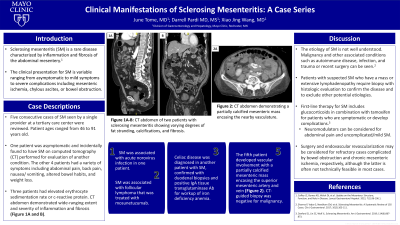Monday Poster Session
Category: Colon
P1676 - Clinical Manifestations of Sclerosing Mesenteritis: A Case Series
Monday, October 23, 2023
10:30 AM - 4:15 PM PT
Location: Exhibit Hall

Has Audio

June Tome, MD
Mayo Clinic
Rochester, MN
Presenting Author(s)
June Tome, MD, Darrell S.. Pardi, MD, MS, Xiao Jing Wang, MD
Mayo Clinic, Rochester, MN
Introduction: Sclerosing mesenteritis (SM) is a rare disease characterized by inflammation and fibrosis of the abdominal mesentery. The clinical presentation for SM is variable; some patients are asymptomatic or experience mild symptoms while others present with complications including mesenteric ischemia, chylous ascites, or bowel obstruction.
Case Description/Methods: Five consecutive cases of SM seen by a single provider were reviewed. Patient ages ranged from 46 to 91 years old. One patient was asymptomatic and incidentally found to have SM on computed tomography (CT) performed for evaluation of another condition. The other 4 patients had a variety of symptoms including abdominal pain, back pain, nausea/ vomiting, altered bowel habits, and weight loss. Three patients had elevated erythrocyte sedimentation rate or c-reactive protein. CT abdomen demonstrated wide-ranging extent and severity of inflammation and fibrosis (Figure 1A and B). SM was associated with norovirus in one patient and with lymphoma in another case. The fifth patient developed vascular involvement with a partially calcified mesenteric mass encasing the superior mesenteric artery and vein (Figure 2). CT-guided biopsy was negative for malignancy. She had a history of essential thrombocytosis, precluding tamoxifen use, and therefore was treated with prednisone for 6 months with improvement in her gastrointestinal symptoms and stability of the mesenteric mass on subsequent CT.
Discussion: Although the etiology of SM is not well understood, it is often seen as a primary condition. Malignancy and other associated conditions such as autoimmune disease, infection, and trauma or recent surgery can be seen. Patients with suspected SM who have a mass or extensive lymphadenopathy require biopsy with histologic evaluation to confirm the disease and to exclude other potential etiologies. First-line therapy for SM includes glucocorticoids in combination with tamoxifen for patients who are symptomatic or develop complications. Neuromodulators can be considered for patients with isolated abdominal pain and uncomplicated mild SM findings. Surgery and endovascular revascularization may be considered for refractory cases complicated by bowel obstruction and chronic mesenteric ischemia, respectively, although the latter is often not technically feasible in most cases.

Disclosures:
June Tome, MD, Darrell S.. Pardi, MD, MS, Xiao Jing Wang, MD. P1676 - Clinical Manifestations of Sclerosing Mesenteritis: A Case Series, ACG 2023 Annual Scientific Meeting Abstracts. Vancouver, BC, Canada: American College of Gastroenterology.
Mayo Clinic, Rochester, MN
Introduction: Sclerosing mesenteritis (SM) is a rare disease characterized by inflammation and fibrosis of the abdominal mesentery. The clinical presentation for SM is variable; some patients are asymptomatic or experience mild symptoms while others present with complications including mesenteric ischemia, chylous ascites, or bowel obstruction.
Case Description/Methods: Five consecutive cases of SM seen by a single provider were reviewed. Patient ages ranged from 46 to 91 years old. One patient was asymptomatic and incidentally found to have SM on computed tomography (CT) performed for evaluation of another condition. The other 4 patients had a variety of symptoms including abdominal pain, back pain, nausea/ vomiting, altered bowel habits, and weight loss. Three patients had elevated erythrocyte sedimentation rate or c-reactive protein. CT abdomen demonstrated wide-ranging extent and severity of inflammation and fibrosis (Figure 1A and B). SM was associated with norovirus in one patient and with lymphoma in another case. The fifth patient developed vascular involvement with a partially calcified mesenteric mass encasing the superior mesenteric artery and vein (Figure 2). CT-guided biopsy was negative for malignancy. She had a history of essential thrombocytosis, precluding tamoxifen use, and therefore was treated with prednisone for 6 months with improvement in her gastrointestinal symptoms and stability of the mesenteric mass on subsequent CT.
Discussion: Although the etiology of SM is not well understood, it is often seen as a primary condition. Malignancy and other associated conditions such as autoimmune disease, infection, and trauma or recent surgery can be seen. Patients with suspected SM who have a mass or extensive lymphadenopathy require biopsy with histologic evaluation to confirm the disease and to exclude other potential etiologies. First-line therapy for SM includes glucocorticoids in combination with tamoxifen for patients who are symptomatic or develop complications. Neuromodulators can be considered for patients with isolated abdominal pain and uncomplicated mild SM findings. Surgery and endovascular revascularization may be considered for refractory cases complicated by bowel obstruction and chronic mesenteric ischemia, respectively, although the latter is often not technically feasible in most cases.

Figure: Figure 1A-B: CT abdomen of two patients with sclerosing mesenteritis showing varying degrees of fat stranding, calcifications, and fibrosis. Figure 2: CT abdomen demonstrating a partially calcified mesenteric mass encasing the nearby vasculature.
Disclosures:
June Tome indicated no relevant financial relationships.
Darrell Pardi: Abbvie – Consultant. Boehringer Ingelheim – Consultant. ExeGI – Consultant, Grant/Research Support. Ferring – Consultant. Finch – Grant/Research Support. Immunic – Consultant. Merck – Consultant. Ohelio – Advisory Committee/Board Member. Otsuka – Consultant. Rebiotix – Grant/Research Support. Rise – Consultant, Grant/Research Support. Seres – Grant/Research Support. Summit – Consultant. Takeda – Grant/Research Support. Vedanta – Consultant.
Xiao Jing Wang indicated no relevant financial relationships.
June Tome, MD, Darrell S.. Pardi, MD, MS, Xiao Jing Wang, MD. P1676 - Clinical Manifestations of Sclerosing Mesenteritis: A Case Series, ACG 2023 Annual Scientific Meeting Abstracts. Vancouver, BC, Canada: American College of Gastroenterology.
